NVIDIA has been at the lead of AI technology, offering free courses on generative AI, GPUs, robotics, chips, and more, enhancing understanding globally transforming numerous sectors, and advancing intelligent computing.
Progress in AI has been accelerated and paths for revolutionary breakthroughs in data science, autonomous systems, and deep learning cleared thanks to their proficiency with GPU-accelerated computing.
One of NVIDIA’s goals is to enable universal access to AI education which is made possible by its decision to offer free AI courses. These courses tackle a broad range of AI topics from basic concepts to complex applications.
With the guidance of experts in different fields such as computer vision, natural language processing, and reinforcement learning learners can delve into these topics easily.
By providing these courses for free, NVIDIA is promoting a worldwide community of AI researchers, developers, and enthusiasts as well as facilitating access to AI education.
This program is in harmony with NVIDIA’s mission to enable individuals to exploit the potential of AI to be a part of its growth and development.
Let’s delve deep into the amazing free courses offered by NVIDIA.
1. Building A Brain in 10 Minutes
The Building A Brain in 10 Minutes program provided by NVIDIA’s Deep Learning Institute is an intriguing investigation of the psychological and biological origins of the first neural networks ever created.
Understanding how neural networks utilize data to comprehend and learn the mathematical concepts underlying neutron by learners is made possible in just ten minutes.
Anyone with a basic understanding of Python 3 programming concepts such as functions, loops, dictionaries, and arrays, as well as the ability to compute a regression line to fully grasp content can take this introductory course.
The main goal of this program is to provide students with an elementary knowledge of neural networks and a peek into the complex deeper workings of these essential AI building blocks.
For learners seeking to delve deeper into the field of deep learning, this program offers follow-up materials.
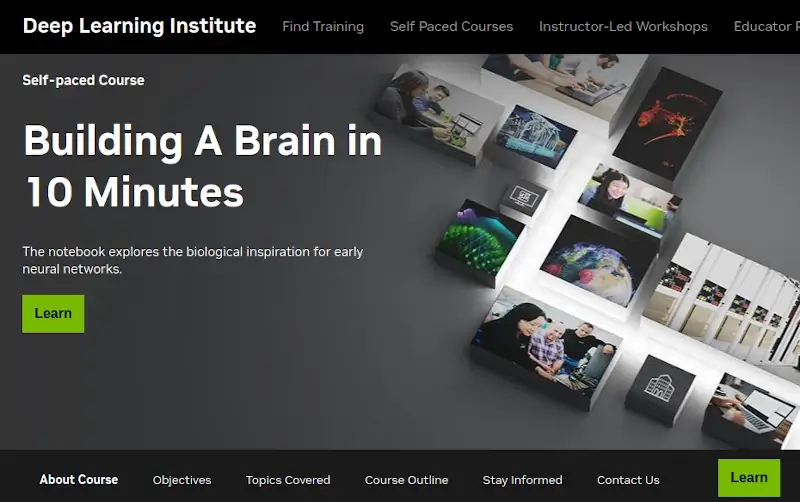
The course takes a short period and is freely accessible making it an appealing choice for anyone interested in exploring the intriguing field of deep learning. For those interested in this course, visit the NVIDIA Deep Learning Institute website.
This course is guaranteed engaging and enlightening experience, whether you’re a novice trying to understand the fundamentals of deep learning or an enthusiast eager to expand your knowledge.
2. Building Video AI Applications on Jetson Nano
The NVIDIA Deep Learning Institute’s Building Video AI Applications on Jetson Nano course is employed in learning by students to understand the development of DeepStream applications that utilize object detection and classification networks to annotate video streams.
Using the NVIDIA Jetson Nano Developer Kit, participants can practice and gain knowledge in sophisticated video analytics firsthand. A basic understanding of Python 3 programming concepts and the Linux command line is essential in this free intermediate-level course.
The course demonstrates how AI-based video understanding may provide significant insights such as improving client experiences or object recognition in videos.
According to this course, the NVIDIA Jetson Nano Developer Kit is an excellent platform for simultaneously running numerous neural networks, making it a perfect setting for exploring intelligent video analytics.
By utilizing the capabilities of the Jetson Nano or other Jetson platforms at the Edge, the skills gained in this course can be applied to a wide range of projects in the future.
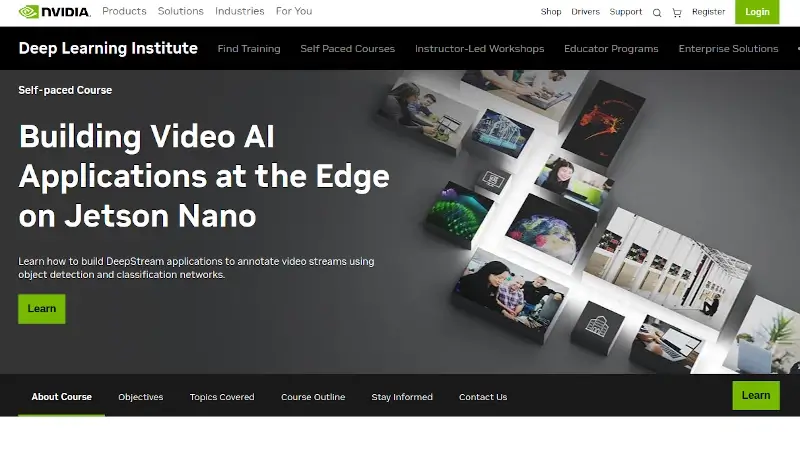
Interested individuals can visit the NVIDIA Deep Learning Institute webpage to enroll in this stimulating course and embark on the process of developing video AI apps at the Edge.
This course presents an engaging learning environment whether you intend on learning more about the possibilities of AI at the edge or improving your skill set in intelligent video analytics.
3. Generative AI Explained
Generative AI Explained, a NVIDIA Deep Learning Institute course provides a no-code introduction to the exciting field of generative artificial intelligence.
This course strives to provide users learners with a thorough understanding of the concepts and applications of generative AI, while also recognizing the potential and challenges that this rapidly evolving field presents.
Students will gain knowledge about the potential and capabilities of this state-of-the-art technology by exploring Generative AI, which utilizes neural networks to identify patterns and structures in data to create new material.
By the completion of the course, learners will have an excellent grasp of generative AI and be more capable of implementing the range of tools related to this technology.
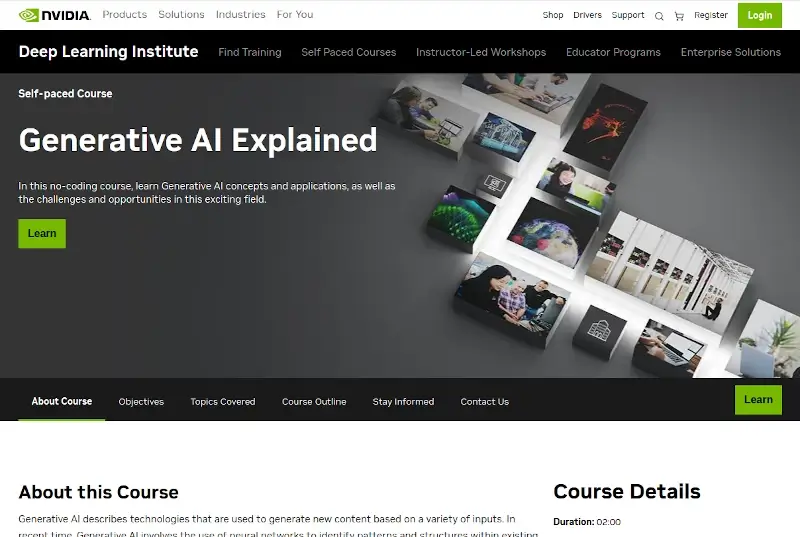
Key subjects addressed in this program include defining and explaining the concept of Generative AI, outlining its different applications, and clarifying the potential and challenges that the discipline presents.
This online two-hour course provides an approachable introduction to the field of Generative AI without requiring any prior knowledge.
This course is a great way for you to discover more about the fascinating field of generative AI, whether you’re an aspiring enthusiast or professional looking to advance your skills.
4. AI in the Data Center
Introduction to AI in the Data Center is a course that provides a thorough analysis of artificial intelligence (AI) and its real-world uses.
It not only explains how training and inference are carried out within a deep learning workflow but also includes basic concepts like machine learning and deep learning.
The course also explores the architectural complexities and historical development of GPUs, emphasizing their revolutionary role in the advancement of AI technology.
Learners with also explore deep learning frameworks, the AI software stack, and essential elements for implementing AI workloads in data centers—including on-premises, cloud, hybrid, and multi-cloud environments.
In addition, the course covers the requirements for multi-system AI clusters and guides infrastructure planning, covering cluster management tools, servers, networking, and storage.
Also, the course provides a fundamental introduction to AI and GPU computing in the data center and is designed for IT specialists, system and network administration, DevOps professionals, and data centers.
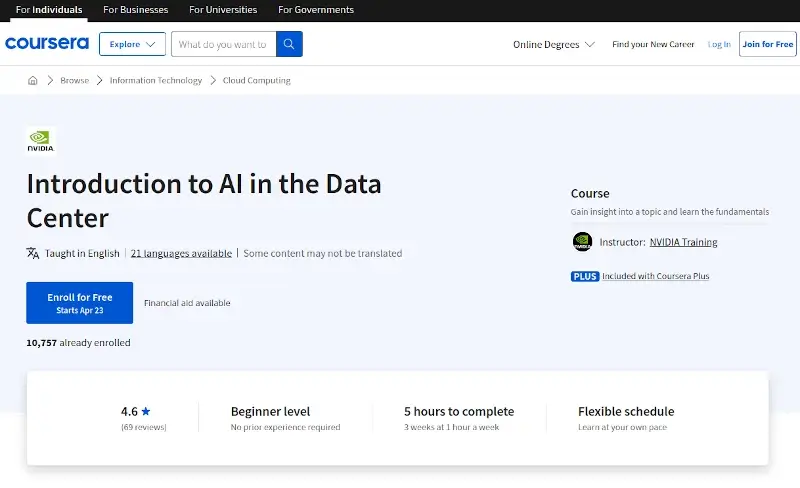
It is also a helpful study tool for the NVIDIA Certified Associate – “AI in the Data Center” certification, which offers a path for competence expansion and professional advancement.
Learners have a priceless opportunity to enhance their professional experience in data center operations and advance their knowledge of AI.
In the ever-evolving field of artificial intelligence (AI), whether your goal is to enhance your professional experience in data center operations or to increase your level of knowledge in AI.
5. Augment your LLM Using RAG
Augment your LLM Using RAG, a course that offers a high-level introduction to Retrieval Augmented Generation and how it enriches Generative AI (GenAI).
This basic course covers the introductory part of NVIDIA’s core components, which include commonly utilized open-source software frameworks.
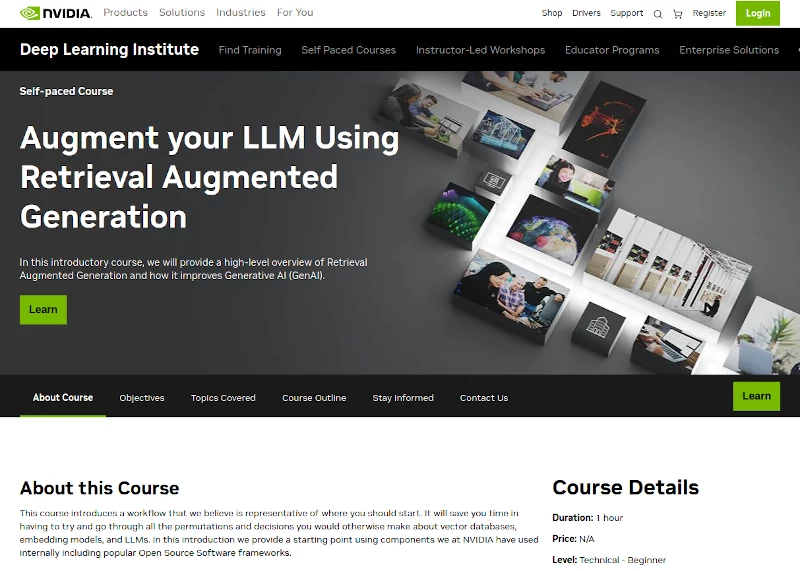
This one-hour lecture which is specifically designed for technical novices, seeks to simplify the concepts of LLMs, vector databases, and embedding models to save time and make decision-making simpler.
For learners seeking to learn from an expert, private classes can be arranged, or the calendar of public workshops may be reviewed. This online course is an excellent beginning platform for learning about Retrieval Augmented Generation and its influences on Generative AI.
6. Building RAG Agents with LLMs
The course Building RAG Agents with LLMs provides an in-depth introduction to retrieval-augmented generation (RAG) and large language models (LLMs). The main topics addressed in this course are the deployment and effective implementation of deep learning models to handle user needs.
In tackling LLMs, students will examine sophisticated orchestration mechanisms, dialogue management, and efficient tooling techniques.
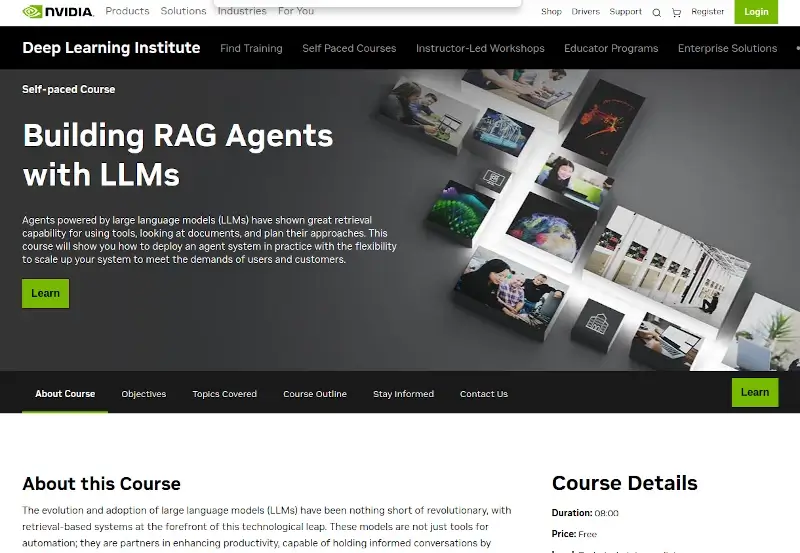
LLM system composition, dialogue management, document reasoning, embedding models, and RAG agent modularization are all addressed in the course. Building dynamic and effective systems using Gradio, LangChain, Microservices, and LangServe are emphasized in this course.
This 8-hour program necessitates intermediate Python proficiency, transfer learning, acquaintance with PyTorch, and a basic understanding of deep learning.
For those seeking to learn through an expert, private workshops can be requested or a review of the public workshop schedule can be done. This program is a valuable opportunity to understand the development of RAG agents with LLMs.
7. Mastering Recommender Systems
Mastering Recommender Systems is an NVIDIA course that explores the techniques adopted by Kaggle Grandmasters in winning a competition in data science centered around developing an e-commerce recommendation system.
Concepts such as the two-stage model of recommender systems, candidate generation, co-visitation matrices, feature selection, engineering for a ranker model, and model ensembling will be well demonstrated to students.
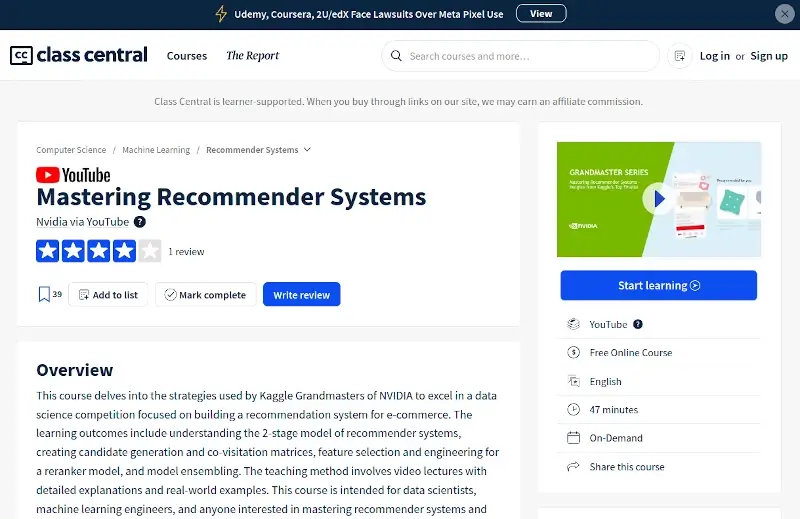
This program is developed for individuals interested in understanding recommender systems and being a part of data science-related competitions, machine learning engineers, and data scientists.
The video lectures provided are a source of thorough educational experience, including thorough explanations and real-world applications.
8. Getting Started with AI on Jetson Nano
Getting Started with AI on Jetson Nano a NVIDIA course is a platform that provides makers, self-taught developers, and fans of embedded technology a chance to unveil the power of Artificial Intelligence.
Thanks to this course, users are able to run multiple neural networks simultaneously for objectives including segmentation, object identification, picture classification, and audio processing.
Learners will build a computer vision model-based deep learning classification project by employing Jupyter iPython notebooks on their own Jetson Nano.
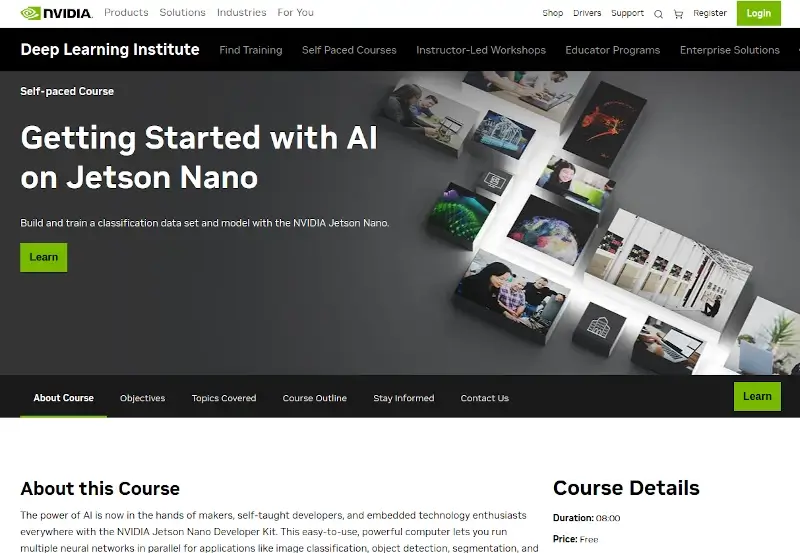
Those intending to enroll in this course must have a basic understanding of Python and require the NVIDIA Jetson Nano Developer Kit along with additional hardware components.
It gives learners an extensive educational experience and is a component of the NVIDIA Deep Learning Institute’s program to give real-world, interactive training in Artificial Intelligence and accelerated computing.
9. How to Perform Large-Scale Image Classification
How to Perform Large-Scale Image Classifications is an NVIDIA course whose participants have to learn how to perform exemplarily in large-scale Image Classification to win the Google Landmark Recognition 2020 Kaggle competition.
With an extensive selection of classes, several modeling approaches, and effective code implementation for picture classification, learners will gain an understanding of the challenges associated with landmark identification.
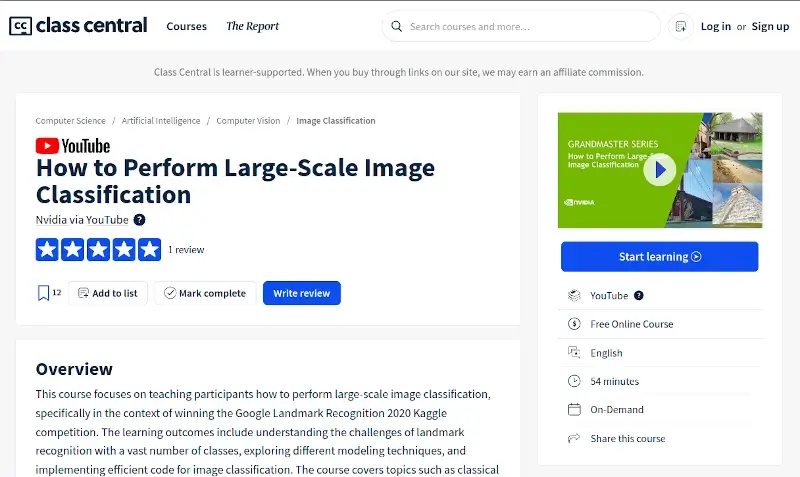
Conventional techniques, validation strategies, model architecture, ensembling, post-processing, fine-tuning, and augmentation techniques like cutouts are all covered in the course.
It is developed for data scientists, machine learning professionals, and individuals with an interest in computer vision-related deep learning challenges.
Conclusion
You can Learn about the AI world with NVIDIA, which is a leader in AI technology, and also start a unique learning experience with their nine free AI courses.
These courses provide a hands-on approach to comprehending the complexity of AI, ranging from constructing AI on Jetson Nano to mastering recommender systems and large-scale picture classification.
You can also improve your abilities with hands-on, top-tier training by exploring the complexities of computer vision, LLMs, and generative AI.
The nine courses offer the first steps towards realizing the potential of artificial intelligence, regardless of your background in data science, machine learning, or AI.
With NVIDIA, you can fully realize your potential in the field of artificial intelligence and be part of the AI revolution.
